Author: William M. Peaster, author of Metaversal; Translation: Golden Finance xiaozou
< h2 style="text-align: left;">
1,
Parallel Introduction to gameplay
Parallel is A strategic card game where players compete with each other and try to reduce their opponent's health from 30 to 0 first.
This game has 40 cards. Players start with 5 cards, but at any time, players can have up to 8 cards. Before Parallel starts, players have the option to "reshuffle" the deck, whereby they can put back any number of cards in their hand and draw a corresponding number of cards.
2, game mode introduction
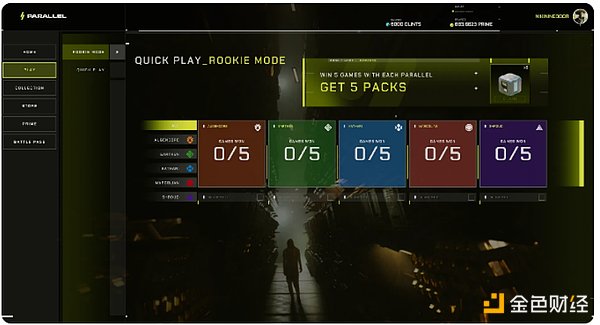
To satisfy players at different stages , Parallel public beta has various game modes:
(1)RookieNovice mode
New players will start the novice mode after reading the game tutorial. Players start the game with 1 of 3 Paragons, which have passive deck effects and are unlocked for the following five factions: Augencore, Earthen, Kathari, Marcolian, and The Shroud.
The goal here is to win in each Parallel and unlock rewards in the process. Rewards for each Parallel’s first five wins include new Paragon, common and legendary Apparition (non-NFT) card packs, and Apparition starter decks. Successfully winning 25 games across all Parallel games will reward you with additional Apparition packs, which you can use to replenish your base (NFT) cards.
(2)AI mode and Unrankednon-ranked mode
p>
After unlocking your first newbie deck, AI mode and Unranked mode are available. AI mode is great for testing different cards and combinations without affecting your ranking or win-loss ratio. Unranked mode provides a similar non-competitive environment where players are free to experiment with their cards.
(3)RankedRanking mode
For those who are ready to earn a ranking by playing matches, Ranked mode requires playing 10 ranked matches to determine your initial ranking. During this beta phase and beyond, Ranked Mode will allow players to earn PRIME, Parallel’s core in-game currency, through wins.
Please note that the number of PRIME earned from wins in ranked mode can increase as you rank up and is affected by the following factors: Number of NFT cards, winning streak, whether there is Parallel Avatar, etc.
3. Main gameplay mechanism
In Parallel, A player's game mainly includes a card drawing phase and a card playing phase.
Draw Phase – During this initial phase, players draw cards from their decks.
Card playing phase - During this period, players can play the cards in their hands, use characters to attack, and use skills. Players can perform any number of actions based on their available energy.
Parallel has four basic card types that you need to pay attention to:
Unit cards - these Cards represent the player's combat character, with attack and health points.
Effect card - Effect card takes effect immediately when used, but the effect will not last on the field.
Relic Cards - These cards provide ongoing effects or skills that can affect the game in various ways.
Upgrade card - Upgrade card is attached to the unit card to improve character skills or health.
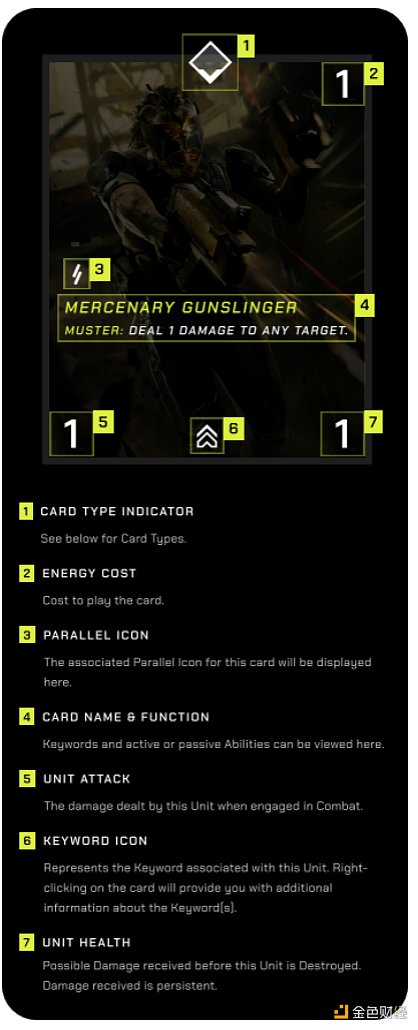
p>
After you understand the basics of cards and how they are played, it is important to understand the main gameplay concepts you will encounter. These concepts are:
Energy - used for playing cards. Each card has an energy cost.
Banking - This is a strategy in which players reserve cards for future plays.
Muster - Triggers a specific effect when a card is played.
Pacifist - Characters with this attribute cannot attack.
Shielded - An effect that represents protection from initial damage.
Salvage - Allows players to recycle cards from the trash.
Sponsored Business Content
In summary, these main mechanisms lead to the emergence of some basic strategies.
For example, a balanced deck is key. To be more competitive, your deck should contain unit, relic, effect cards, and upgrade cards to deal with different situations. Energy management is also important. Pay attention to your energy levels and plan your moves and plays based on your existing energy.
In addition, reserving cards and arranging your unit cards are crucial to success. Banking mechanics can prepare for future card plays, ensuring you have the right cards to play when needed, strategically positioning your unit cards, and deciding when to attack or defend based on your opponent's card play, which can determine Your success or failure.
As you become more and more experienced in Parallel gameplay, you will find that your playing style will become more advanced, and you will find that you are better at predicting your opponent's moves. moves and combine powerful cards together, so keep practicing and you'll eventually find your rhythm.
4, Construction ManagementParallelDeck
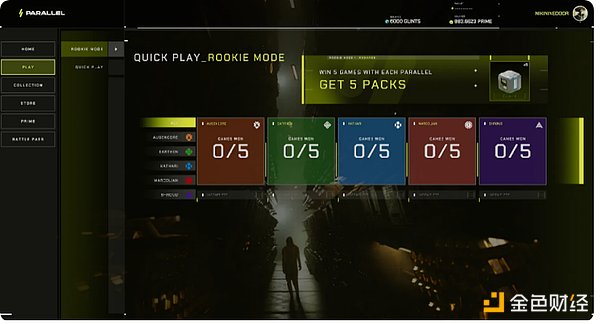
You don't need to purchase any Parallel NFT cards to start the Parallel game. You can get a set of novice cards through the rookie novice mode.
After that, however, you'll need to win or acquire additional cards to enhance your skills or generate multiple decks.
Parallel has deployed cards through OpenSea related secondary markets on both Ethereum and Base L2 expansion solutions, and can "echo" cards from the former to the latter. That said, buying cards sold on OpenSea is a straightforward way to acquire the assets you want, but it will soon be possible to rent cards through groups such as ParagonsDAO.
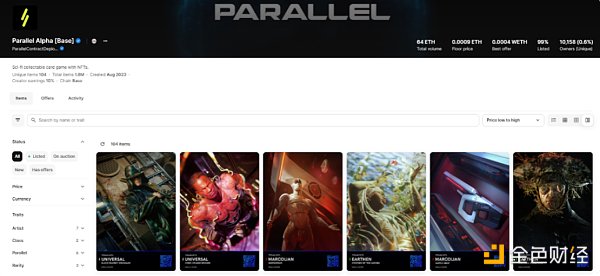
p>
First of all, it is wise to focus on building a deck with a single Parallel faction. Each of these five camps has its own unique advantages. Below is a brief summary of each camp.
Augencore - Specializes in enhancing character abilities, increasing their skills and health.
Earthen - Focuses on hand control and strategic application of defensive roles.
Kathari - Good at generating clone characters, suitable for control-centered game styles.
Marcolian - Focuses on an offensive playstyle, aiming to quickly whittle down the opponent's health.
The Shroud - The aim is to remove a character from the game to prevent the opponent from utilizing their full resources.
5, PRIME Overview
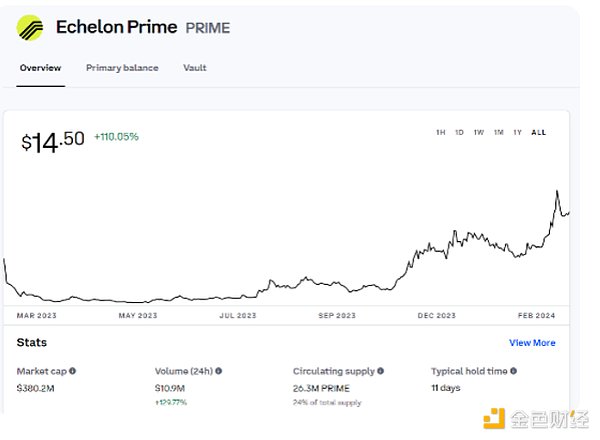
PRIME is the core utility token of the Parallel world, which includes Parallel TCG and Parallel Colony - an artificial intelligence game currently in development.
Players can earn PRIME by winning ranked matches in Parallel TCG. As mentioned before, the amount of PRIME earned per win is affected by several factors, such as the player's matchmaking rating, winning streak, etc.
Please note that there is currently a daily cap and players can earn PRIME based on their best 5 daily wins. On average, if you win 5 times a day for a month, you'll earn 10 PRIME, which is about $150 at current exchange rates. Not bad!
After you earn PRIME, you can hold it, exchange it for other assets, such as ETH, or purchase various Sink (products and services) of the Parallel ecosystem ), such as Artigraphs (limited edition signed Parallel cards), Glints (in-game currency for non-NFT purchases), and Cosmetics (equipable skins and emotes).
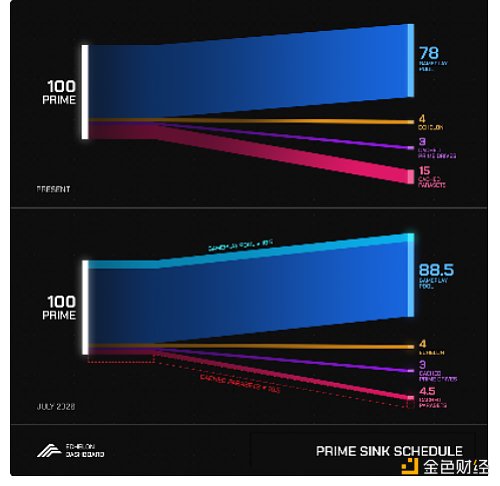
p>
Part of the PRIME used to purchase products or services will be redistributed to various components of the ecosystem, such as gameplay pools, Sink creators, etc. This process is intended to promote the continued flow of PRIME into the game economy and achieve a sustainable play-to-earn model.
6, Summary
This Thursday, anyone You can download the Parallel game launcher for public testing.
This is the beginning of a new era for Parallel, giving us a glimpse into the future of digital collections and the game economy. Indeed, while Parallel’s gameplay itself is, in my opinion, deep and interesting, the most exciting aspect is the way Parallel cleverly integrates NFT and PRIME tokens into the game world.
This approach makes players not just participants, but real stakeholders. As Parallel continues to grow, these players will be able to take advantage of the booming game economy, with its unique market dynamics, trading strategies and investment opportunities.
Looking ahead, the development of the Parallel world, including Parallel Colony and other potential future games, shows us a vast future ecosystem, and PRIME will become the lifeblood that connects and supports different gaming experiences. This interconnection could provide a blueprint for games that not only share currencies but also facilitate the formation of shared economies and narrative worlds.
But ultimately, the true success of Parallel and its model will depend on its community participation, the balance of its play-to-earn mechanism, and the continued development of its game world. If it can continue to develop and build in these areas, breakthrough success may be just around the corner!
 JinseFinance
JinseFinance
 JinseFinance
JinseFinance JinseFinance
JinseFinance JinseFinance
JinseFinance JinseFinance
JinseFinance JinseFinance
JinseFinance JinseFinance
JinseFinance JinseFinance
JinseFinance JinseFinance
JinseFinance Bitcoinist
Bitcoinist Bitcoinist
Bitcoinist